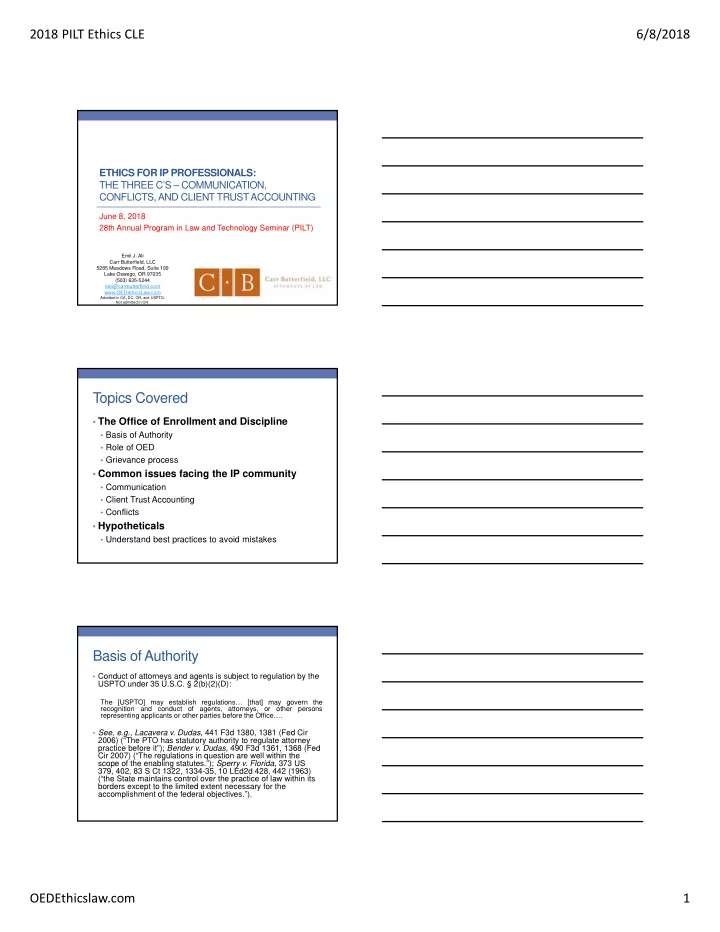

2018 PILT Ethics CLE 6/8/2018 ETHICS FOR IP PROFESSIONALS: THE THREE C’S – COMMUNICATION, CONFLICTS, AND CLIENT TRUST ACCOUNTING June 8, 2018 28th Annual Program in Law and Technology Seminar (PILT) Emil J. Ali Carr Butterfield, LLC 5285 Meadows Road, Suite 199 Lake Oswego, OR 97035 (503) 635-5244 eali@carrbutterfield.com www.OEDethicsLaw.com Admitted in CA, DC, OR, and USPTO. Not admitted in OH. Topics Covered • The Office of Enrollment and Discipline • Basis of Authority • Role of OED • Grievance process • Common issues facing the IP community • Communication • Client Trust Accounting • Conflicts • Hypotheticals • Understand best practices to avoid mistakes Basis of Authority • Conduct of attorneys and agents is subject to regulation by the USPTO under 35 U.S.C. § 2(b)(2)(D): The [USPTO] may establish regulations… [that] may govern the recognition and conduct of agents, attorneys, or other persons representing applicants or other parties before the Office…. • See, e.g., Lacavera v. Dudas , 441 F3d 1380, 1381 (Fed Cir 2006) (“The PTO has statutory authority to regulate attorney practice before it”); Bender v. Dudas , 490 F3d 1361, 1368 (Fed Cir 2007) (“The regulations in question are well within the scope of the enabling statutes.”); Sperry v. Florida , 373 US 379, 402, 83 S Ct 1322, 1334-35, 10 LEd2d 428, 442 (1963) (“the State maintains control over the practice of law within its borders except to the limited extent necessary for the accomplishment of the federal objectives.”). OEDEthicslaw.com 1
2018 PILT Ethics CLE 6/8/2018 Role of OED • OED can be considered the “primary regulator” of Patent and Trademark Attorneys, and the “sole regulator” of Patent Agents. • USPTO Rules of Professional Conduct are codified into 37 CFR Part 11 as: • Rules X.Y = 37 CFR 11.X0Y • ABA Rule 1.2 = 37 CFR 11.102 • Tip – Remeber Reciprocal Discipline • OH. Gov. Bar R. V(20) • 37 CFR 11.24 Grievance Process • An investigation may be initiated through a grievance, information, or evidence from any source suggesting “grounds for discipline.” See 37 CFR 11.22(a). • Investigation can close with no action, warning letter, diversion, public or private discipline through settlement, or formal charges. See 37 CFR 11.22(h) • Clear and convincing standard • Committee on Discipline as grand jury Communication • First Action Pendency (2008 – 2015) - Patent OEDEthicslaw.com 2
2018 PILT Ethics CLE 6/8/2018 Communication • 37 CFR 11.104 Communication. • (a) A practitioner shall: • (1) Promptly inform the client of any decision or circumstance with respect to which the client's informed consent is required by the USPTO Rules of Professional Conduct; • (2) Reasonably consult with the client about the means by which the client's objectives are to be accomplished; • (3) Keep the client reasonably informed about the status of the matter; • (4) Promptly comply with reasonable requests for information from the client; and • (5) Consult with the client about any relevant limitation on the practitioner's conduct when the practitioner knows that the client expects assistance not permitted by the USPTO Rules of Professional Conduct or other law. • (b) A practitioner shall explain a matter to the extent reasonably necessary to permit the client to make informed decisions regarding the representation. Communication • No rule on how often you must communicate with a client. • Communication problems could be part of a pattern. • In re Swyers , Proceeding No. D2016-20 (USPTO Jan. 26, 2017). • Trademark attorney alleged to have permitted non-attorneys to practice trademark law with little to no supervision, and to communicate directly with clients. • Multiple fraudulent or digitally manipulated trademark specimens were allegedly filed with USPTO. • Compare: In re Schoeneman , 777 A.2d 259 (D.C. 2001) • Virginia reciprocal matter where the court found that a lawyer’s failure to return client’s calls for “the last three weeks” did not violate Rule 1.4. • Evidence that lawyer spoke with client monthly regarding the complex fraud investigation was sufficiently reasonable. Client Trust Accounting • Practitioners are required to keep property of clients and third parties separate from their own; also known as the anti-commingling rule. See 37 CFR 11.115. • Prevent issues with creditors of client or lawyer • Conversion and Misappropriation • Negligent vs. intentional • In re Edwards , 990 A.2d 501 (D.C. 2010) (“disbarment is warranted unless the misappropriation stems from ‘nothing more than simple negligence’”) • Strict Liability • Attorney Grievance Comm’n v. Stolarz , 842 A.2d 42 (Md. 2004) (“an unintentional violation . . . is still a violation of the attorney’s affirmative duties imposed by the rule”). OEDEthicslaw.com 3
Recommend
More recommend